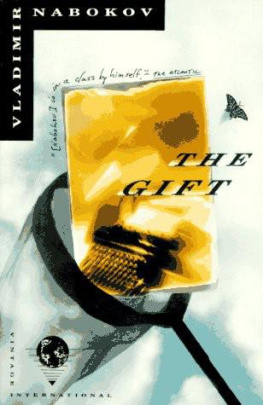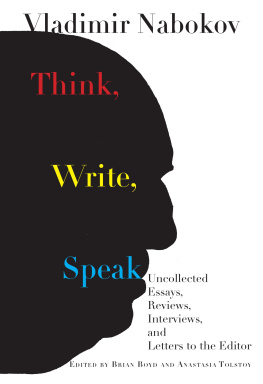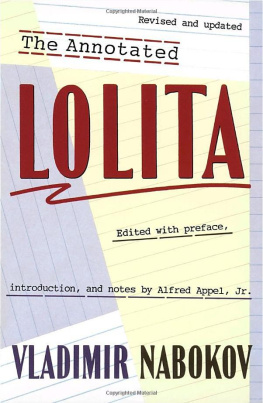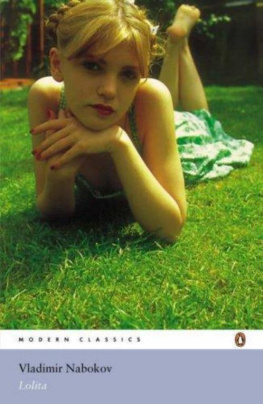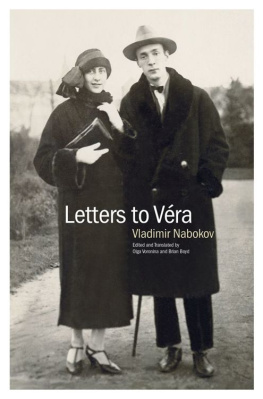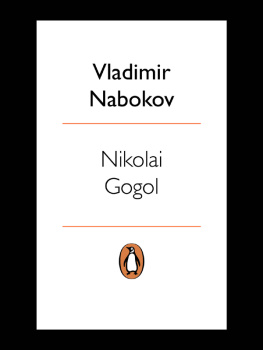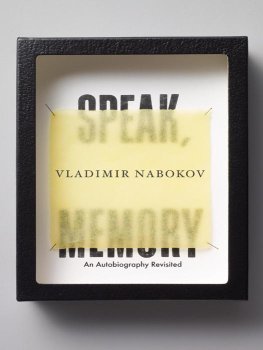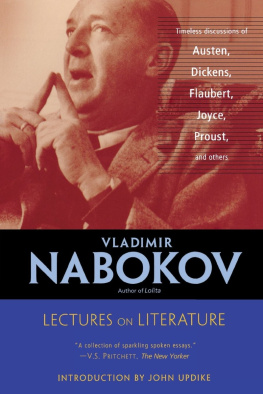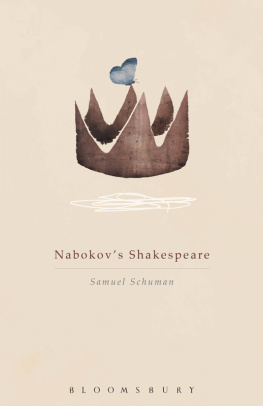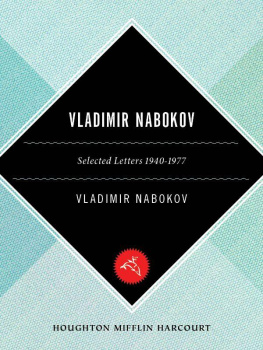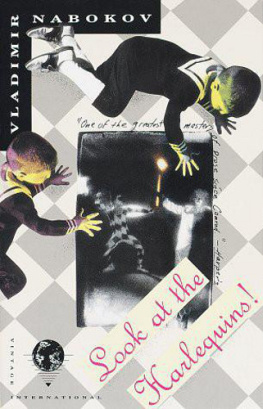Vladimir Nabokov - The Gift
Here you can read online Vladimir Nabokov - The Gift full text of the book (entire story) in english for free. Download pdf and epub, get meaning, cover and reviews about this ebook. year: 1991, publisher: Vintage, genre: Detective and thriller. Description of the work, (preface) as well as reviews are available. Best literature library LitArk.com created for fans of good reading and offers a wide selection of genres:
Romance novel
Science fiction
Adventure
Detective
Science
History
Home and family
Prose
Art
Politics
Computer
Non-fiction
Religion
Business
Children
Humor
Choose a favorite category and find really read worthwhile books. Enjoy immersion in the world of imagination, feel the emotions of the characters or learn something new for yourself, make an fascinating discovery.
- Book:The Gift
- Author:
- Publisher:Vintage
- Genre:
- Year:1991
- Rating:3 / 5
- Favourites:Add to favourites
- Your mark:
- 60
- 1
- 2
- 3
- 4
- 5
The Gift: summary, description and annotation
We offer to read an annotation, description, summary or preface (depends on what the author of the book "The Gift" wrote himself). If you haven't found the necessary information about the book — write in the comments, we will try to find it.
The Gift — read online for free the complete book (whole text) full work
Below is the text of the book, divided by pages. System saving the place of the last page read, allows you to conveniently read the book "The Gift" online for free, without having to search again every time where you left off. Put a bookmark, and you can go to the page where you finished reading at any time.
Font size:
Interval:
Bookmark:

THE GIFT
A N O V E L B Y
Vladimir Nabokov
Translated from the Russian by Michael ScammeU
with the collaboration of the author
V I N T A G E I N T E R N A T I O N A L
VINTAGE BOOKS
A DIVISION OF RANDOM HOUSE, INC.
NEW YORK
TO VERA
Foreword
THE greater part of The Gift (in Russian, Dar) was written in 1935-1937, in Berlin; its last chapter was completed in 1937
on the French Riviera. The leading 6migr6 magazine SovremennyeZapiski, conducted in Paris by a group of former members of the Social Revolutionary party, published the novel serially (63-67, 1937-8), omitting, however, Chapter Four, which was rejected for the same reasons that the biography it contains was rejected by Vasiliev in Chapter Three (p. 219): a pretty example of life finding itself obliged to imitate the very art it condemns. Only in 1952, almost twenty years after it was begun, did there appear an entire edition of the novel brought out by that Samaritan organization, the Chekhov Publishing House, New York. It is fascinating to imagine the regime under which Dar may be read in Russia.
I had been living in Berlin since 1922, thus synchronously with the young man of the book; but neither this fact, nor my sharing some of his interests, such as literature and lepidoptera, should make one say "aha" and identify the designer with the design.
I am not, and never was, Fyodor Godunov-Cherdyntsev; my father is not the explorer of Central Asia that I still may become some day; I never wooed Zina Mertz, and never worried about the poet Koncheyev or any other writer. In fact, it is rather in Koncheyev, as well as in another incidental character, the novelist Vladimirov, that I distinguish odds and ends of myself as I was circa 1925.
In the days I worked on this book, I did not have the knack of recreating Berlin and its colony of expatriates as radically and ruthlessly as I have done in regard to certain environments in my later, English, fiction. Here and there history shows through artistry.
Fyodors attitude toward Germany reflects too typically perhaps the crude and irrational contempt that Russian emigres had for the
"natives" (in Berlin, Paris or Prague). My young man is moreover influenced by the rise of a nauseous dictatorship belonging to the period when the novel was written and not to the one it patchily reflects.
The tremendous outflow of intellectuals that formed such a prominent part of the general exodus from Soviet Russia in the first years of the Bolshevist Revolution seems today like the wanderings of some mythical tribe whose bird-signs and moon-signs I now retrieve from the desert dust. We remained unknown to American intellectuals (who, bewitched by Communist propaganda, saw us merely as villainous generals, oil magnates, and gaunt ladies with lorgnettes). That world is now gone. Gone are Bunin, Aldanov, Remizov. Gone is Vladislav Khodasevich, the greatest Russian poet that the twentieth century has yet produced. The old intellectuals are now dying out and have not found successors in the so-called Displaced Persons of the last two decades who have carried abroad the provincialism and Philistinism of their Soviet homeland.
The world of The Gift being at present as much of a phantasm as most of my other worlds, I can speak of this book with a certain degree of detachment. It is the last novel I wrote, or ever shall write, in Russian. Its heroine is not Zina, but Russian Literature.
The plot of Chapter One centers in Fyodors poems. Chapter Two is a surge toward Pushkin in Fyodors literary progress and contains his attempt to describe his fathers zoological explorations. Chapter Three shifts to Gogol, but its real hub is the love poem dedicated to Zina. Fyodors book on Chernyshevski, a spiral within a sonnet, takes care of Chapter Four. The last chapter combines all the preceding themes and adumbrates the book Fyodor dreams of writing some day: The Gift. I wonder how far the imagination of the reader will follow the young lovers after they have been dismissed.
The participation of so many Russian muses within the orchestra-tion of the novel makes its translation especially hard. My son Dmitri Nabokov completed the first chapter in English, but was T H E G I F T
prevented from continuing by the exigencies of his career. The four other chapters were translated by Michael Scammell. In the winter of 1961, at Montreux, I carefully revised the translation of all five chapters. I am responsible for the versions of the various poems and bits of poems scattered throughout the book. The epigraph is not a fabrication. The epilogic poem mimicks an Onegin stanza.
VLADIMER NABOKOV
Montreux, March 28, 1962
GIFT
An oak is a tree. A rose is a flower. A deer is an
animal. A sparrow is a bird. Russia is our father-land. Death is inevitable.
P. SMIRNOVSKI, A Textbook of
Russian Grammar.
ONE cloudy but luminous day, towards four in the afternoon on April the first, 192- (a foreign critic once remarked that while many novels, most German ones for example, begin with a date, it is only Russian authors who, in keeping with the honesty peculiar to our literature, omit the final digit) a moving van, very long and very yellow, hitched to a tractor that was also yellow, with hyper-trophied rear wheels and a shamelessly exposed anatomy, pulled up in front of Number Seven Tannenberg Street, in the west part of Berlin. The van's forehead bore a star-shaped ventilator. Running along its entire side was the name of the moving company in yard-high blue letters, each of which (including a square dot) was shaded laterally with black paint: a dishonest attempt to climb into the next dimension. On the sidewalk, before the house (in which I too shall dwell), stood two people who had obviously come out to meet their furniture (in my suitcase there are more manuscripts than shirts). The man, arrayed in a rough greenish-brown overcoat to which the wind imparted a ripple of life, was tall, beetle-browed and old, with the gray of his whiskers turning to russet in the area of the mouth, in which he insensitively held a cold, half-defoliated cigar butt The woman, thickset and no longer young, with bowlegs and a rather attractive pseudo-Chinese face, wore an astrakhan jacket; the wind, having rounded her, brought a whiff of rather good but slightly stale perfume. They both stood motionless and watched fixedly, with such attentiveness that one might think they were about to be short-changed, as three red-necked husky fellows in blue aprons wrestled with their furniture.
Some day, he thought, I must use such a scene to start a good, thick old-fashioned novel. The fleeting thought was touched with a careless irony; an irony, however, that was quite unnecessary, because somebody within him, on his behalf, independently from him, had absorbed all this, recorded it, and filed it away. He himself had only moved in today, and now, for the first time, in the still unac-customed state of local resident, he had run out to buy a few things.
He knew the street and indeed the whole neighborhood: the boardinghouse from which he had moved was not far; until now, however, the street had revolved and glided this way and that, without any connection with him; today it had suddenly stopped; henceforth it would settle down as an extension of his new domicile.
Lined with lindens of medium size, with hanging droplets of rain distributed among their intricate black twigs according to the future arrangement of leaves (tomorrow each drop would contain a green pupil); complete with a smooth tarred surface some thirty feet across and variegated sidewalks (hand-built, and flattering to the feet), it rose at a barely perceptible angle, beginning with a post office and ending with a church, like an epistolary novel. With a practiced eye he searched it for something that would become a daily sore spot, a daily torture for his senses, but there seemed to be nothing of that sort in the offing, and the diffuse light of the gray spring day was not only above suspicion but even promised to mollify any trifle that in more brilliant weather would not fail to crop up; this could be anything: the color of a building, for instance, that immediately provoked an unpleasant taste in the mouth, a smack of oatmeal, or even halvah; an architectural detail that effusively caught one's attention every time one passed by; the irritating sham of a caryatid, a hanger-on and not a support, which, even under a lighter burden, would crumble into plaster dust; or, on a tree trunk, fastened to it by a rusty thumbtack, a pointless but perpetually preserved corner of a notice in longhand (runny ink, blue runaway dog) that had outlived its usefulness but had not been fully torn off; or else an object in a shop window, or a smell that refused at the last moment to yield a memory it had seemed ready to shout, and remained instead on its street corner, a mystery withdrawn into itself. No, there was nothing like that (not yet in any case); it would be a good idea, he thought, some time at leisure to study the sequence of three or four kinds of shops and see if he were right in conjecturing that such a sequence followed its own law of composition, so that, having found the most frequent arrangement, one could deduce the average cycle for the streets of a given city, for example: tobacco shop, pharmacy, greengrocery. On Tannenberg Street these three were dissociated, occurring on different corners; perhaps, however, the rhythmic swarming had not yet established itself, and in the future, yielding to that counterpoint (as the proprietors either went broke or moved) they would gradually begin to gather according to the proper pattern: the greengrocery, with a glance over its shoulder, would cross the street, so as to be at first seven and then three doors away from the pharmacyin somewhat the same way as the jumbled letters find their places in a film commercial; and at the end there is always one that does a kind of flip, and then hastily assumes its position (a comic character, the inevitable Jack the Sack among the new recruits); and thus they will wait until an adjacent place becomes vacant, whereupon they will both wink across at the tobacco shop, as if to say: "Quick, over here"; and before you know it they are all in a row, forming a typical line.
Next pageFont size:
Interval:
Bookmark:
Similar books «The Gift»
Look at similar books to The Gift. We have selected literature similar in name and meaning in the hope of providing readers with more options to find new, interesting, not yet read works.
Discussion, reviews of the book The Gift and just readers' own opinions. Leave your comments, write what you think about the work, its meaning or the main characters. Specify what exactly you liked and what you didn't like, and why you think so.

